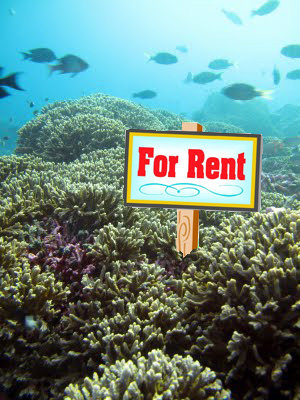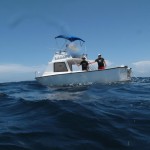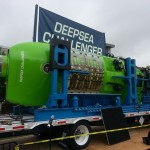I think it’s fair to say that when most folks think about conservation, or biology in general, money is not the first thing that pops into their heads. Indeed, many people I know in those fields consider money, commerce and economics to be somewhat foreign, a necessary evil perhaps, to keep society going and keep putting food on the table so that we can concentrate on the more important business of protecting the earth from further damage. I freely admit to being one of these people; I can remember the scientific name of some obscure worm that I heard once in 1992, but I’m buggered if I can balance my checkbook properly.
 There is a field however, where economics and conservation collide, a strange place where the emphasis is not necessarily on the inspirational aspects of that which we would all like to protect (e.g. “oooh, look at the pretty fishies!”), but rather on the cold hard dollar value thereof (i.e. “Get yer red snapper, 8.99 a pound!”). Specifically, it’s about putting a dollar value on healthy ecosystems based on what they can do for society, and then seeking to protect them based on those values. I am talking about Ecological Economics, and this week I’m in the Florida Keys for a workshop that will bring together a range of stakeholders to talk about the prospects of using this approach to conserve the coral reefs of the Keys and, perhaps, beyond.
There is a field however, where economics and conservation collide, a strange place where the emphasis is not necessarily on the inspirational aspects of that which we would all like to protect (e.g. “oooh, look at the pretty fishies!”), but rather on the cold hard dollar value thereof (i.e. “Get yer red snapper, 8.99 a pound!”). Specifically, it’s about putting a dollar value on healthy ecosystems based on what they can do for society, and then seeking to protect them based on those values. I am talking about Ecological Economics, and this week I’m in the Florida Keys for a workshop that will bring together a range of stakeholders to talk about the prospects of using this approach to conserve the coral reefs of the Keys and, perhaps, beyond.
The workshop is being put together by PERC, the Coral Restoration Foundation and Georgia Aquarium’s Conservation Fellow Brett Howell. Brett has a foot in both worlds, having undergrad training in biology and graduate training in business administration. It will take people like Brett to work out whether it’s really possible to use market-driven approaches to conserve reefs, and it will take the rest of us getting out of our comfort zone for a while to consider these alternative, or perhaps more appropriately additional ways, that effective reef conservation might be achieved.
The old-fashioned way to conserve a reef, or any precious habitat, was to put a fence around it (virtual or real) and say “No, you can’t go there, we have to protect this bit”. Later, zoned management systems came into being, like the one that is used to effectively manage the Great Barrier Reef. Both of these are based on an assessed but often intangible value assigned to the reef, along the lines of its being “important”, or “unique”, or being home to X-many species found nowhere else, but ecological economics takes a different approach. Under EE, you work out exactly how much that importance/uniqueness is worth, in dollars, and then create a market for those services that can raise money to protect it. For reefs this might include the value to fishing industries of reefs as fish nurseries, or the value of reefs to the SCUBA diving industry, maybe even the value of productive reefs as carbon sinks in the global carbon budget (if indeed they are). Having put a value on those services, we can then raise money to restore degraded reefs so that they can provide those services. We can either extract fees for people to use those services, a bit like fixing up a rental property, or we can sell the restored reef outright, which is more like flipping a house.
There are lots of challenges to these approaches. One is how the hell do we work out what a reef is really worth? It seems so easy but believe me it gets hard very quickly, and you flirt with a world of estimated (read “fudged”) values and biologically uncertain (read “rubbery”) numbers that are pretty much anathema to market folks: who’s going to invest in uncertain numbers, right? The next challenge is property rights: you can’t just go around willy nilly restoring reefs and selling them; usually they are not yours to restore, let alone sell; this particular minefield is Brett’s area of special expertise. The restoring part itself is a little easier (settle down, I said easier, not easy!); we know from the great work of CRF and SECORE and other groups that corals can be propagated sexually and asexually and used to restore degraded reefs, just like plants can be raised in nurseries and used to restore denuded forests. The next challenge is mitigating the things that degraded the reef in the first place. Be they hurricanes, human damage, diseases or climate change impacts, these are giant uncertainty factors that threaten the market-driven approach. Then there’s the issue of measuring success: what constitutes a “restored reef” anyway? Is it a certain percentage of coral cover?, a certain amount of fish diversity?, or is it when the ecosystem services are being produced at the rate they were originally valued at? Finally, who’s going to pay for the restored reef at the end of it all? In other words, is there a market for these ecosystem services? All these questions and more require answers for anyone willing to entertain an ecological economics approach to conservation, and it’s exactly these issues that a pretty diverse group of stakeholders is going to be discussing at this workshop in Key Largo for the next 2 days.
I have to admit to a certain amount of skepticism when it comes to money and science/conservation. Money so often taints things, skews objectivity and provides the wrong motivations for people to do all the wrong things (as 2008 so graphically proved). If you don’t believe me, watch this, and especially this. It also makes it all about us and our tawdry love affair with little bits of green paper, not about the reef, and that’s something that bothers me on a very deep level. Why can’t we value the reef’s inspirational aspects, its biodiversity, dare I say it, its beauty, and be motivated to conserve it based on those alone? Why do we have to make it about money in order to make people care? Somehow (and not a little ironically) that cheapens the reef to me, no matter how many dollars per square meter the formulas say it’s worth. But, and it’s a big but, having said all that, I am willing to listen and give ecological economics a chance because at this point no options should be off the table for reef conservation, the situation is that dire. So, I’m looking forward to hearing the stakeholder’s ideas and thinking about this approach and whether it holds any practical value for the Keys and beyond. I agree with Brett that many of the most productive collaborations exist at the interfaces of disciplines and in this case, market principles and conservation seem strange bedfellows indeed. Who knows, maybe they’ll prove strangely compatible and end up making sweet conservation love together; let’s hope so.
If you have any experience with ecological economics and particularly payment for ecosystem services programs (marine or otherwise), we’d love to hear from you in the comments. I’ve already picked DSN’s-own Rick’s brain about it, which was very helpful, but since it’s a brainstorming sort of workshop, we’d love to hear your ideas and experiences.
I’ll be tweeting the workshop with hashtag #ReefMPES






Play to people’s altruism… Adopt-a-Reef!
(works for Oceana: https://store.oceana.org/?akid=2232.366409.eNg6v4&rd=1&t=2&utm_campaign=adoption&utm_medium=mailing&utm_source=newsletter )
Or, for the marine aquarist, one could literally adopt the reef. Near the reef in question, drop a few barge-loads of coral rock. Let it sit awhile, then sell it off as live rock (as they do at Tampa Bay Saltwater: http://tbsaltwater.com/ordering/pricelist.html ). One could even collect select fish species to captive breed, to make the offspring available for purchase).
Hi Al! We were just having an interesting conversation today in my Forest Ecosystems class about REDD and the inherent dangers of attaching monetary value to an ecosystem, particularly when you consider the very bad things people sometimes do to get some of those little green pieces of paper. Also, markets are finicky and are based on the whims of today’s society, for better or for worse. (Before anyone gets upset at me, I’m not arguing the merits of REDD – just pointing out some of the concerns.)
Quite a few people in my program are interested in ecosystem services and it certainly is a hot topic at the moment. I agree that putting a price on nature cheapens the entire concept. You can’t just shove everything in the universe into an arbitrary market system invented by an egocentric species. That being said, some people can only be reached by putting a price tag on things. It’s very disheartening, but I think there are people who cannot possibly comprehend the value of nature just for being nature (it’s rather tragic actually – so much of the wonder of life is entwined with nature, and if you can’t appreciate that, well I can’t even comprehend what that must be like). The ecosystem services sector is attempting to reach these people and ultimately enact policy change, because let’s face it, Washington runs on dollars and cents and not morals! I hope you enjoy the workshop and I look forward to hearing your thoughts when you return!
Although I agree with Christy about the inherent risks in creating a market for something that isn’t a typical product, I’m not so sure that this necessarily cheapens coral reefs or degrades their value. There is a substantial movement within the business world of corporate social responsibility, and I think many people would be surprised at how many good things (both concerning the health of the environment as well as other social issues such as health and poverty) are resulting from attaching economic mindsets to such problems. I haven’t looked too much into the actual program beyond what the article says and is linked to, but I think the best part about this is that it brings coral conservation awareness to those who otherwise should but would not care. I can’t see coral becoming a commodity or there being a booming reef industry down the road, but I think this thing is on the right track and it does provide some possible solutions to the problem of how can scientists and conservationists reach out to the general public. Again, one cannot ignore the fact that money is often not the best motivator and does bring the possibility of corruption and greed with it, so it’s all in the implementation of Ecological Economics. I’m an undergrad with a business management major and an ecology minor, and most of my fellow business students know very little about the good that we can do for the health of our oceans if we just organize, and I think this is a great place to start.
It turns out that in very specific places, and the Keys are one, coral reefs are in some way connected to pretty much every part of the economy. In that sense, putting a dollar value on their health makes a lot of sense. I wish I could summarise the workshop in another blog post, but it was more of a planning session than anything, so the results will likely not manifest for a while. Suffice to say there were many options put forth on how to make reef conservation self sustaining, from voluntary user fee programs to much more sophisticated big dollar public/private partnerships. It will be interesting to see how it turns out.
Do you have a contact email for Brett?
Dave, I can be reached at [email protected]. Thanks, Brett